Mechanical Belt Fastening Systems
No matter what you’re moving, minimizing downtime and maximizing output are always top priorities—and they can be significantly affected by the way you splice your conveyor belts. Most belt conveyor operations rely on one or both common methods of splicing: mechanical belt fastening or vulcanization.
Mechanical Belt Fasteners vs. Vulcanization
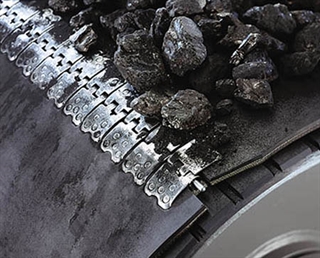 Mechanical Belt Fastening is the process of joining conveyor belt ends by metal hinges or plates. Vulcanization is the process of joining belt ends through heat or chemicals.
Mechanical Belt Fastening is the process of joining conveyor belt ends by metal hinges or plates. Vulcanization is the process of joining belt ends through heat or chemicals.
The vulcanization of heavy-duty conveyor belts – whether hot or cold—is a time-consuming process that requires special skills, expensive equipment, extreme accuracy in the cutting and stripping of belt ends, and a thorough knowledge of solvents, bonding materials, and compatible cover and fill materials.
Mechanical Belt Fastening involves the use of mechanical belt fasteners (also called conveyor belt lacing). Mechanical belt fasteners combine strength and durability with affordability and easy installation.
Heavy-Duty Belt Fastener Types
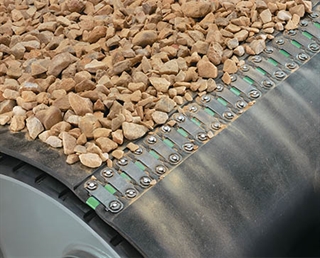 In heavy-duty applications like coal, cement, mining, and aggregate, there are two main belt fastener types: Hinged Plate and Solid Plate. Hinged plate fasteners, often used with small pulleys, are installed into each end of the belt and then joined together and held in place with a pin. Solid plate fasteners consist of one plate that is installed into both ends of the belt and fastened together. Solid plate fasteners are used with larger pulleys and for applications that require a sift-free splice. These fasteners are installed into the belt using bolts, rivets, or staples (depending on belt type and application) and are available in a variety of metals.
In heavy-duty applications like coal, cement, mining, and aggregate, there are two main belt fastener types: Hinged Plate and Solid Plate. Hinged plate fasteners, often used with small pulleys, are installed into each end of the belt and then joined together and held in place with a pin. Solid plate fasteners consist of one plate that is installed into both ends of the belt and fastened together. Solid plate fasteners are used with larger pulleys and for applications that require a sift-free splice. These fasteners are installed into the belt using bolts, rivets, or staples (depending on belt type and application) and are available in a variety of metals.
 Heavy Duty
Heavy Duty
Mechanical Belt Fastener
Selection Calculator
Light-Duty Belt Fastener Types
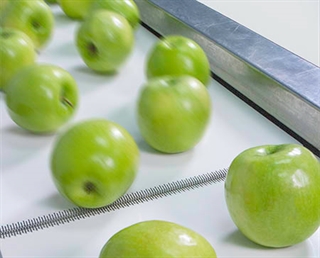 In light-duty applications like agriculture, parcel handling, food, and laundry, fasteners are available in hook and lacing styles, are installed into both ends of the belt, and are joined together with a hinge pin. Installation methods vary from machine application to using hand tools, and the fasteners are available in a variety of metals, plastics, and in some cases, food-grade materials.
In light-duty applications like agriculture, parcel handling, food, and laundry, fasteners are available in hook and lacing styles, are installed into both ends of the belt, and are joined together with a hinge pin. Installation methods vary from machine application to using hand tools, and the fasteners are available in a variety of metals, plastics, and in some cases, food-grade materials.
Choosing the proper mechanical belt fastening system is one of the most important steps in splicing a belt.
Use the filters at the left to refine your results and find the mechanical belt fastening system that is best suited to your application.
Apply FiltersClose
Refine Results
Please wait while we gather your results.
use imperialuse metric
Belt ThicknessPIW MaxkN/m MaxMin. Pulley Diameter
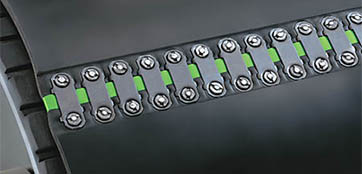
Belt Thickness3/16" - 1-3/16"Belt Thickness5 mm - 30 mm
PIW Max150 PIW - 620 PIWkN/m Max30 kN/m - 100 kN/m
Min. Pulley Diameter12" - 48"Min. Pulley Diameter300 mm - 1220 mm

Belt Thickness1/4" - 5/8"Belt Thickness6 mm - 16 mm
PIW Max190 PIW - 300 PIWkN/m Max33 kN/m - 52 kN/m
Min. Pulley Diameter6" - 9"Min. Pulley Diameter152 mm - 230 mm
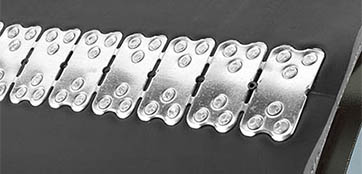
Belt Thickness7/32" - 15/16"Belt Thickness6 mm - 24 mm
PIW Max400 PIW - 800 PIWkN/m Max70 kN/m - 140 kN/m
Min. Pulley Diameter14" - 36"Min. Pulley Diameter350 mm - 900 mm
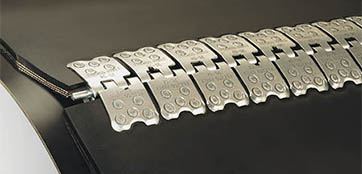
Belt Thickness1/8" - 1"Belt Thickness3 mm - 25.5 mm
PIW Max330 PIW - 2000 PIWkN/m Max60 kN/m - 350 kN/m
Min. Pulley Diameter5" - 42"Min. Pulley Diameter127 mm - 1050 mm

PIW MaxST500 to ST2500
(428 PIW - 2140 PIW)kN/m Max60 kN/m - 350 kN/m
Min. Pulley DiameterST500 to ST2500

Belt Thickness1/4" - 25/32"Belt Thickness6mm - 20mm
PIW Max800 PIW - 2000 PIWkN/m Max1400 to 3500kN/m
Min. Pulley Diameter10” to 20”Min. Pulley Diameter250mm to 500mm

Belt Thickness5/32" - 3/4"Belt Thickness4 mm - 19 mm
PIW Max0 PIW -1430 PIWkN/m Max35 kN/m - 250 kN/m
Min. Pulley Diameter6" - 20"Min. Pulley Diameter152 mm - 508 mm
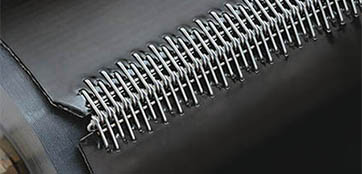
Belt ThicknessUp thru 25/64"Belt ThicknessUp thru 10 mm
PIW Max200 PIWkN/m Max35 kN/m
Min. Pulley Diameter15/16" - 7"Min. Pulley Diameter24 mm - 175 mm
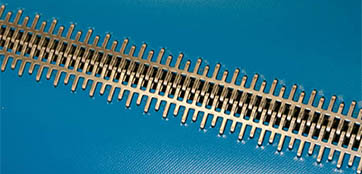
Belt Thickness.059" - .197"Belt Thickness1.5 mm - 5 mm
PIW Max100 PIWkN/m Max17 kN/m
Min. Pulley Diameter1.6" - 3.0"Min. Pulley Diameter40 mm - 75 mm
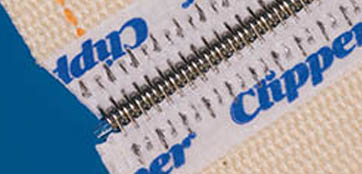
Belt Thickness.078"Belt Thickness2 mm
PIW MaxNot ApplicablekN/m MaxNot Applicable
Min. Pulley Diameter15/16"Min. Pulley Diameter25 mm
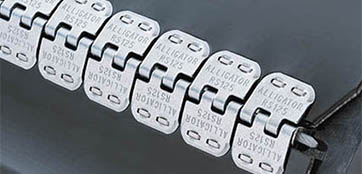
Belt Thickness1/16" - 1/4"Belt Thickness1.5 mm - 6.4 mm
PIW Max100 PIW - 200 PIWkN/m Max17 kN/m - 35 kN/m
Min. Pulley Diameter2" - 4"Min. Pulley Diameter50 mm - 102 mm

Belt ThicknessUp thru 1/2"Belt ThicknessUp thru 12.7 mm
PIW Max25 PIW - 200 PIWkN/m Max4.3 kN/m - 35 kN/m
Min. Pulley Diameter1" - 14"Min. Pulley Diameter25 mm - 356 mm
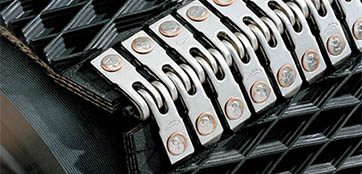
Belt Thickness13/64" - 15/64"Belt Thickness5 mm - 5.8 mm
PIW Max300 PIWkN/m Max52 kN/M
Min. Pulley Diameter3-1/2"Min. Pulley Diameter88 mm
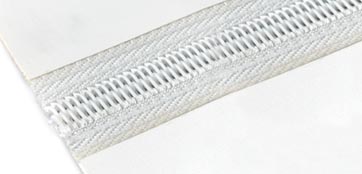
Belt Thickness1/16" - 3/16"Belt Thickness1.6 mm - 4.6 mm
PIW Max50 PIWkN/m Max8.7 kN/m
Min. Pulley Diameter3/8" - 5/8"Min. Pulley Diameter10 mm - 15 mm

Belt ThicknessUp thru 1/8"Belt ThicknessUp thru 3.2 mm
PIW Max40 PIW - 65 PIWkN/m Max7 kN/m - 11 kN/m
Min. Pulley Diameter1-1/2" - 3"Min. Pulley Diameter38 mm - 75 mm

Belt ThicknessNot ApplicableBelt ThicknessNot Applicable
PIW MaxNot ApplicablekN/m MaxNot Applicable
Min. Pulley DiameterNot ApplicableMin. Pulley DiameterNot Applicable